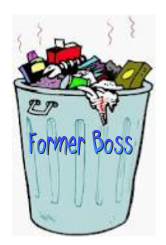Harry Urschel recently published a blog post that serves as a good reminder that not all aspects of your career experience are ripe for storytelling in job interviews.
One of the cardinal rules of cardinal rules of job search is not to trash a  former employer. As Urschel points out, “job search coaches will consistently tell you to never bash or criticize previous employers. It almost never results in a good outcome for you. Yet… it’s one of the most common mistakes people make in job interviews.” See this recent post for an illustration of an employer-trashing that I believe is a mistake.
former employer. As Urschel points out, “job search coaches will consistently tell you to never bash or criticize previous employers. It almost never results in a good outcome for you. Yet… it’s one of the most common mistakes people make in job interviews.” See this recent post for an illustration of an employer-trashing that I believe is a mistake.
The temptation to bash and trash a previous boss can come up in a number of ways in an interview, for example in response to questions like these:
- “Why did you leave your last job?”
- “Have you ever had difficulty with a supervisor?” This one has always seemed to me designed to test the interviewee — to see if he or she will fall into the trap of disparaging the ex-boss.
Interviewees may also be inclined to criticize a former boss when asked behavioral questions with a negative edge to them. Urschel gives a sample dangerous answer to a question that must have been something like, “Tell me about a project that failed and what you did about it:”
“objectives and milestones weren’t well defined for me”
These negativity-tinged behavioral questions are common; interviewers want to know how you’ve overcome bad situations. See examples of such questions among the samples here, starting at Question 25.
One reason negative stories about former bosses is a bad idea is that the interviewer will assume you will also trash your boss if you get the job you’re interviewing for.
Urschel points to another reason:
Whether you like it or not, or think it’s fair or not, an interviewer generally will naturally take your employers side in the stories you relate. Anyone who has been in a supervisory or managerial role for any length of time, comes to realize that there are always two sides to every story. And while they certainly realize that an employee may have legitimate complaints, the tendency is to wonder what the other side of the story might be.
Urschel prescribes a positive spin to the way you begin stories that relate to former employers:
“The project failed because I didn’t make sure I had objectives and milestones clearly defined for me. It was a great lesson to learn and a mistake I certainly won’t let happen again.”
“My manager and I had differing views on how to deal with customers, and I didn’t creatively come up with a resolution that would satisfy us both. The experience has taught me how to be more solution oriented.”
Bottom line is to put yourself in the interviewer’s shoes and consider how your ex-employer stories sound to your prospective employer.
